De Amerikaanse dichteres Sharon Olds werd geboren op 19 november 1942 in San Francisco. Zie ook alle tags voor Sharon Olds op dit blog.
Still Life in Landscape
It was night, it had rained, there were pieces of cars and
half-cars strewn, it was still, and bright,
a woman was lying on the highway, on her back,
with her head curled back and tucked under her shoulders
so the back of her head touched her spine
between her shoulder-blades, her clothes
mostly accidented off, and her
leg gone, a long bone
sticking out of the stub of her thigh—
this was her her abandoned matter,
my mother grabbed my head and turned it and
clamped it into her chest, between
her breasts. My father was driving—not sober
but not in this accident, we’d approached it out of
neutral twilight, broken glass
on wet black macadam, like an underlying
midnight abristle with stars. This was
the world—maybe the only one.
The dead woman was not the person
my father had recently almost run over,
who had suddenly leapt away from our family
car, jerking back from death,
she was not I, she was not my mother,
but maybe she was a model of the mortal,
the elements ranged around her on the tar—
glass, bone, metal, flesh, and the family.
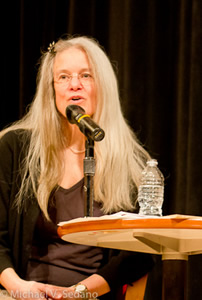
De Amerikaanse schrijver en literaire biograaf Mark Harris (eig. Mark Harris Finklestein) werd geboren op 19 november 1922 in Mount Vernon, New York. Zie ook alle tags voor Mike Harris op dit blog.
Uit:Lying in Bed
“Dear Dr. Youngdahl:
I want to thank you so much for the glorious lunch at Monti’s La Casa Vieja and for giving me Mr. Klang’s address. I have awarded this some thought and I think I will send him my manuscript as soon as I am back from the ski lodge. Until you put the idea into my head I could not picture myself as being the kind of writer who sends something to an agent in crass New York, but I will follow your advice anyhow, because it comes from you. I hope to think of an appropriate title soon, and perhaps at the same time I will arrive at a final decision on how to spell my name. Not that anyone is going to print it. (Please forgive me for the phrase “final decision.” I recognize its redundance. I know I should not offend you who so relentlessly wars against redundance.)
I look forward to further comments you will be making on my manuscript. I recently learned that the abbreviation for “manuscript” is “ms.,” which I consider prophetic because those are my own initials. I had thought “ms.” referred only to the form of address for a woman, and to the magazine of that name.
I was relieved that you did not find my manuscript objectionable, and I was reassured to hear you say you did not in any way interpret the subject matter therein as autobiographical; understanding that that is not my life at all but the lives of characters I have invented: pure fiction out of the whole cloth. I understand now why authors like to print up in front of their books, “All the characters herein are purely fictional and any resemblance to real or living persons is purely coincidental.”
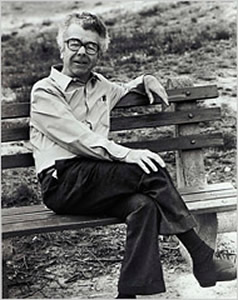
De Oostenrijkse dichter, schrijver en vertaler Christoph Wilhelm Aigner werd geboren op 18 november 1954 in Wels. Zie ook alle tags voor Christoph Wilhelm Aigner op dit blog.
Uit:Eigenleben oder wie schreibt man eine Novelle
„Ich nahm die Polaroid Kamera auf meine Spaziergänge mit. Seit einigen Jahren fotografierte ich mit diesem Gerät, das eigentlich, in fototechnischem Sinn, nur Nachteile hatte. Die Filme waren um ein Vielfaches teurer als die der analogen Spiegelreflexkameras. Tiefenschärfe war schwer zu erreichen. Der Sucher zeigte nicht exakt an, was man aufnehmen wollte, es genügte ein Millimeter Abweichung vom Frontalen, schon entstand ein nicht gewollter Ausschnitt. Die Farben waren zuweilen auch eine Überraschung, je nach Alter der Filme und je nach Temperatur. Zu manipulieren gab es nicht viel: Blitz oder nicht Blitz, automatischer oder manueller Fokus. Die Primitivität dieser Pol-Kamera faszinierte mich. Ich hatte mit raffinierten Kameras und vielen Objektiven in unterschiedlichen Situationen gearbeitet und die Filme selbst entwickelt; jahrelang auch für die Tageszeitung, in der ich Redakteur war. Die Unmittelbarkeit dieser einfachen IS E (Image System), ein robustes Eisengerät, selbst unter den vielen Typen von Polaroid Kameras ein Hinterwäldler, diese, ich sage: störrische Unschuldigkeit, die mich oft überraschte, das heißt, sich der Herrschaft des optischen Planens entzog, fesselte mich mehr als die Möglichkeiten zur Manipulation in der Dunkelkammer. Ich war diesem einfachen Ding nie wirklich gewachsen.”
“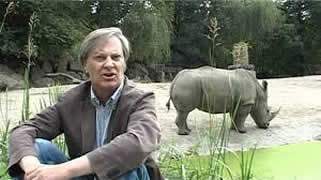
Christoph Wilhelm Aigner (Wels, 18 november 1954)
De Duitse schrijfster Anna Seghers werd op 19 november 1900 geboren in Mainz als Anna Reiling. Zie ook alle tags voor Anna Seghers op dit blog.
Uit: Das siebte Kreuz
“Ernst der Schäfer drehte sich nach dem Radfahrer um. Sein Halstuch wird ihm schon zu heiss, er reisst es ab und wirft es auf das Stoppelfeld wie ein Feldzeichen. Man könnte glauben, das sei eine Geste vor tausend Augenpaaren. Aber nur sein Hündchen Nelli sieht ihn an. Er nimmt seine unnachahmbar spöttisch-hochmütige Haltung wieder auf, aber jetzt mit dem Rücken zur Strasse, mit dem Gesicht zur Ebene, dahin, wo der Main in den Rhein fliesst. Bei der Mündung liegt Mainz. Das stellte dem Heiligen Römischen Reich die Erzkanzler. Und das flache Land zwischen Mainz und Worms, das ganze Ufer war bedeckt von den Zeltlagern der Kaiserwahlen. Jedes Jahr geschah etwas Neues in diesem Land und jedes Jahr dasselbe: dass die Äpfel reiften und der Wein bei einer sanften vernebelten Sonne und den Mühen und Sorgen der Menschen. Denn den Wein brauchten alle für alles, die Bischöfe und Grundbesitzer, um ihren Kaiser zu wählen, die Mönche und Ritter, um ihre Orden zu gründen, die Kreuzfahrer, um Juden zu verbrennen, vierhundert auf einmal auf dem Platz in Mainz, der noch heute der Brand heisst, die geistlichen und weltlichen Kurfürsten, als das Heilige Reich zerfallen war, aber die Feste der Grossen lustig wie nie wurden, die Jakobiner, um die Freiheitsbäume zu umtanzen.
Zwanzig Jahre später stand auf der Mainzer Schiffsbrücke ein alter Soldat Posten. Wie sie an ihm vorüberzogen, die letzten der Grossen Armee, zerlumpt und düster, da fiel ihm ein, wie er hier Posten gestanden hatte als sie eingezogen waren mit den Trikoloren und mit den Menschenrechten, und er weinte laut auf. Auch dieser Posten wurde zurückgezogen. Es wurde stiller, selbst hierzuland. Auch hierher kamen die Jahre 33 und 48, dünn und bitter, zwei Fädchen geronnenes Blut. Dann kam wieder ein Reich, das man heute das Zweite nennt. Bismarck liess seine inneren Grenzpfähle ziehen, nicht um das Land herum, sondern quer durch, dass die Preussen ein Stück ins Schlepptau bekamen. Denn die Bewohner waren zwar nicht gerade rebellisch, sie waren nur allzu gleichgültig wie Leute, die allerhand erlebt haben und noch erleben werden.”
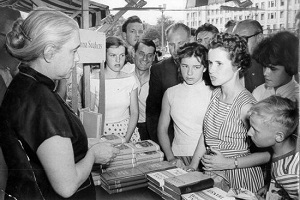
In Oost-Berlijn, 1957
De Amerikaanse dichter Alan Tate werd geboren op 19 november 1899 in de buurt van Winchester, Kentucky. Zie ook alle tags voor Alan Tate op dit blog.
Sonnets Of The Blood I
What is the flesh and blood compounded of
But a few moments in the life of time?
This prowling of the cells, litigious love,
Wears the long claw of flesh-arguing crime.
Consider the first settlers of our bone,
Observe how busily they sued the dust,
Estopped forever by the last dusted stone.
It is a pity that two brothers must
Perceive a canker of perennial flower
To make them brothers in mortality:
Perfect this treason to the murderous hour
If you would win the hard identity
Of brothers a long race for men to run
Nor quite achieved when the perfection’s won.
Sonnets Of The Blood II
Near to me as perfection in the blood
And more mysterious far, is this, my brother:
A light vaulted into your solitude.
It studied burns lest you its rage should smother.
It is a flame obscure to any eyes,
Most like the fire that warms the deepest grave
(The cold grave is the deepest of our lies)
To which our blood is the indentured slave:
The fire that burns most secretly in you
Does not expend you hidden and alone,
The studious fire consumes not one, but two-
Me also, marrowing the self-same bone.
Our property in fire is death in life
Flawing the rocky fundament with strife.
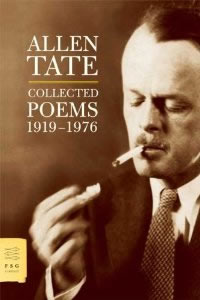
Cover
Zie voor nog meer schrijvers van de 19e november ook mijn twee blogs van 19 november 2011.
